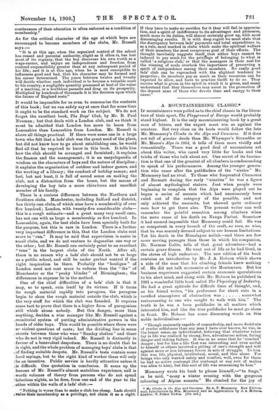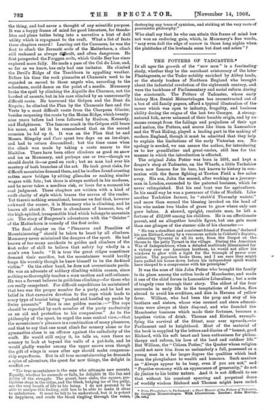A MOUNTAINEERING CLASSIC.*
IF mountaineers were polled as to the chief classic in the litera- ture of their sport, The Playground of Europe would probably stand highest. It is the only mountaineering- book by a great man of letters, and the expert must win as against the amateur. But very close on its heels would follow the late Mr. Mummery's Climbs in the Alps and Caucasus. If it does not tell of greater deeds than Mr. Whymper's Scrambles or Mr. Moore's Alps in 1864, it tells of them more vividly and romantically. There was a good deal of unconscious art about this writer, who cared very little for books and the tricks of those who talk about art. One secret of its fascina- tion is that one of the greatest of all climbers is condescending to speak of his performances. Among the younger genera- tion who came after the pathfinders of the "sixties" Mr.
Mummery had no rival. To those who frequented Chamonix
and Zermatt during the early "nineties" he was a figure of almost mythological stature. Just when people were beginning to complain that the Alps were played. out he
began a series of ascents which had unanimously been ruled out of the category of the possible, and not only achieved the summits, but showed quite ordinary men bow to get there also. The present writer can well remember the painful sensation among climbers when the news came of his death on Nanga Parbat. Somehow it had seemed impossible that Mummery could fail. He was so competent in every branch of the craft, so sure, so wise, that he was scarcely deemed subject to our human limitations. Yet his death in the Himalayan nullah—and there are few more moving passages than those in which his companion,
Dr. Norman Collie, tells of that great adventure—had a certain grave fitness. He went out of life as he had lived, in the stress of high endeavour. The new edition of his book contains an introduction by Mr. J. A. Hobson which shows a side of the man that his climbing friends knew nothing • of. He did not talk economics at the Montenvers. But his business experience suggested certain economic speculations to his alert mind, and along with Mr. Hobson he published in 1891 a wonderful little book called The Physiology of Industry.
He had a great aptitude for difficult lines of thought, and, as his friend writes, "his preference for short cuts in a
rarefied atmosphere of abstraction was somewhat embarrassing to one who sought to walk with him." The truth is be was a born pathfinder in all matters which interested him, and like the true pathfinder he must go alone in front. Mr. Hobson has some discerning words on this noble individualism
"Though eminently capable of comradeship, and more destitute of cruder selfishness than any man I have ever known, he was, in the truest sense, an individualist, believing that whatever value lay in life was realised by strong, free, adventurous action, facing danger and risking failure. It was in no sense that he courted' danger ; but for him a life that was interesting and even useful to himself or others involved a pitting of one's strength and will against more or less inhuman forces in acts of struggle. To him this was life, physical, intellectual, moral, and this alone. For beings who only wanted safety and comfort, well, even for them he had no active contempt (for contempt or any sort of malice was alien to him), but this sort of life was unmeaning to him."
Mummery wrote his book to please himself,—" to tinge," as be said, "many a winter evening with the gorgeous colouring of Alpine sunsets." He climbed for the joy of
• My Climbs is the Alps and Caucasus. By A. F. Mummery. New Edition. with Introduction by Mrs, Mummery and an Appreciation by J. A. Hobson., London; T. Fisher Uuwin. [21s. net.]
the thing, and had never a thought of any scientific purpose.
It was a happy frame of mind for good literature, for theodo- lites and plane tables bring into a narrative a hint of dull utility which is repugnant to the craft. What a list of feats these chapters record ! Leaving oat the Caucasus, he was the
first to climb the Zermatt arete of the Matterhorn, a climb still reckoned as always difficult, and often dangerous. He first prospected the Furggen arete, which Guido Rey has since
explored more fully. He made a pass of the Col du Lion, and, so far as we know, has only had one imitator. He climbed the Devil's Ridge of the Taschhorn in appalling weather. Before his time the rock pinnacles at Chamonix used to be regarded as sacred to those angels who, according to the schoolmen, could dance on the point of a needle. Mummery broke the spell by climbing the Aiguille des Charmoz, not the hardest of ascents, but in his case climbed by an unnecessarily difficult route. He traversed the Grepon and the Dent du Requin; he climbed the Plan by the Chamonix face and the Verte by a most difficult route from the Charpoua Glacier, besides reopening the route by the Moine Ridge, which twenty- nine years before had been followed by Hudson, Kennedy, and Hodgkinson. The famous crack in the Grepon still bears
his name, and let it be remembered that on the second occasion he led up it. It was on the Plan that he and Messrs. Slingsby and Carr spent two days on an ice-slope,
and had to return discomfited; but the time came when the climb was made by taking a route nearer to the
Blaitiere. There have been, other climbers as good on snow and ice as Mummery, and perhaps one or two—though we
should doubt it—as good on rock ; but no man had ever his mastery of both branches of the art. He took great risks, for difficult mountains demand them, and he is often found crossing rotten snow bridges by sitting glissades or making similar wagers with fate ; but there is always method in his madness, and he never takes a needless risk, or loses for a moment his cool judgment. These chapters are written with a kind of swift clarity of style which braces the nerves of the reader. Yet there is nothing sensational, because we feel that, however awkward the corner, it is Mummery who is climbing, and he knows all about it. There is abundance of humour, too, of the high-spirited, irresponsible kind which belongs to mountain air. The story of Burgener's adventures with the " Geister " of the Matterhorn is comedy of the first order.
The final chapter on the " Pleasures and Penalties of Mountaineering" should be taken to heart by all climbers. Mummery never minimised the dangers of the sport. He had known of too many accidents to guides and climbers of the that order of skill to believe that safety lay wholly in a man's own hands. "It is true the great ridges sometimes demand their sacrifice, but the mountaineer would hardly forgo his worship though be knew himself to be the destined victim." On the other band, he does not overestimate perils. He was an advocate of solitary climbing within reason, since nothing so thoroughly teaches a man caution and self-reliance. He was a fervent believer in guideless climbing—for those who are really competent. For difficult expeditions he maintained that two was the proper number for a party, and he had no belief in that excessive devotion to the rope which leads to every type of tourist being "pushed and hustled up peaks by Swiss peasants." Here is one golden maxim :—" The rope should be regarded by each member of the party exclusively as an aid and protection to his companions?' As to the philosophy of the sport, be urged the sane central view,—that the mountaineer's pleasure is a combination of many pleasures, and that to say that one must climb for scenery alone or for gymnastics alone is an offence against the catholicity of the craft. He would still enjoy it, he tells us, were there no scenery to look at beyond the walls of a pot-hole, and he would gladly wander among the upper snows even though the gift of wings in some after age should make cragsman-
ship superfluous. But in all true mountaineering he demands a spice of adventure, the quest for new things, the delight in conflict:— "The true mountaineer is the man who attempts new ascents. Equally, whether he succeeds or fails, he delights in the fun and jollity of the struggle. The gaunt, bare slabs, the square, pre- cipitous steps in the ridge, and the black, bulging ice of the gully, are the very breath of life to his being. I do not pretend to be able to analyse this feeling, still less to be able to make it clear to unbelievers. It must be felt to be understood, but it is potent to happiness, and sends the blood tingling through the veins,
destroying any trace of cynicism, and striking at the very roots of pessimistic philosophy."
Who shall say that he who can attain this frame of mind has not won an enduring gain, which, in Mummery's fine words,. "may even dull the edge of sorrow in those long nights when the platitudes of the lowlands seem but dust and ashes " ?











































 Previous page
Previous page